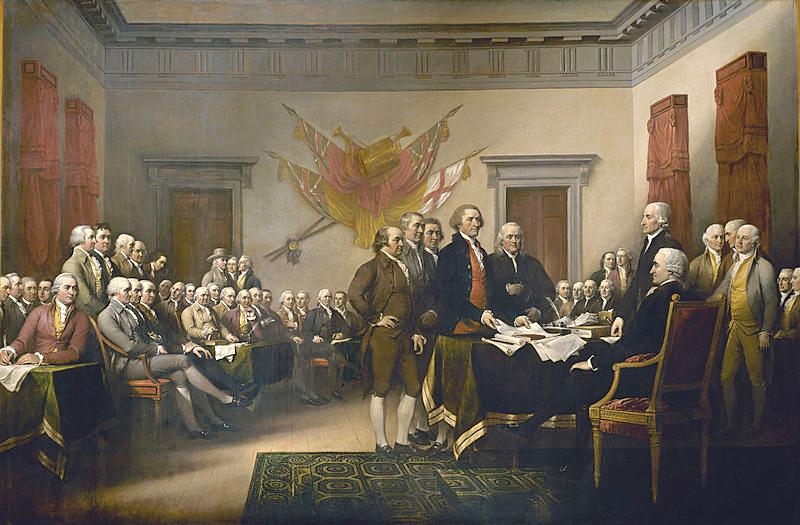Bruning: Ignorance is ignorance: Political theory 101 — Liberalism
Photo courtesy of Wikimedia Commons
Opinion – Declaration of Independence
September 7, 2011
Growing up in western Iowa, aka Steve King
country, I rarely heard the word “liberal” without the word “damn”
in front of it. Damn liberals, just a bunch of hippies trying to
control us. Damn liberal media, just a bunch of hippies trying to
brainwash us. But when you look at the actual meaning of
liberalism, it is generally very appealing to the strong,
independent farmers and blue-collar workers who condemn
it.
Liberalism is one school of political thought
that has been horribly misconstrued in the post-modern era. When
discussing it, it is necessary to differentiate between classical
liberalism and modern liberalism as they now are polar
opposites. The western Iowa modern definition of liberalism has a
reputation of appealing to the “bleeding heart liberals,” the “tree
huggers” and people too lazy to make their own way in the world.
The young “liberals” see themselves as the movers and shakers
of the world, environmentally conscious and forward thinking. While
these feelings are fine, they aren’t truly liberal as the meaning
is much more basic.
The classical version, which came
into being around 1690 with John Locke’s publication of “An Essay
on Human Understanding” and later in “Two Treatises of Government,”
is almost the polar opposite. I don’t have any
particular issue with the Democratic Party’s ideals, however they
shouldn’t (as the Republicans shouldn’t) claim they are in any way
liberal. Maybe it’s time for a new word to describe our political
philosophies …
Ever wonder where the word “libertarianism”
came from? You got it: liberalism. The Ron Pauls of the world would
rather die than admit they are liberals, but, if you simply look at
the words with the base of “liber,” or “the free one” in Latin, you
can see their relation.
John Locke, the father of liberalism,
advocates religious tolerance and individual enlightenment. Locke’s
theory on civil society creates a government that is formed by the
people. As you might guess, the U.S. government is based largely on
this theory. Locke explained that the only legitimate governments
have the consent of the people; without this consent, the
government can be overthrown.
In this theory, individuals can just as easily
choose not to have a government as to choose to form a
government. Locke’s civil society allows individuals
this option as long as those individuals come to some sort of
agreement that they won’t try to kill each other. This agreement is
a basic necessity of human existence and requires no formal
government, which is a basic premise of libertarianism. In fact, it
is the exact opposite of the democratic or “liberal” desire for an
involved government.
Liberalism still cannot function, however, if
it solely relies on the individual. It requires individuals coming
together in a public to decide how they want to interact. Whether
they decide to form a government or not, they still must come
together in that initial compromise.
When people come together with differing
ideas, they can be pushing for their own individual needs but still
acting for the good of the public. Granted, this idea has been
abused in recent years by people acting selfishly and for economic
gain. But when you look at this idea from the standpoint of not
wanting to kill or be killed as motivation for protecting your
individual interests, it doesn’t seem quite as selfish.
The underlying intent of liberalism is the
individual — the importance of the individual and formulating your
own individual ideas. This is where we find a liberal education. An
education where students are exposed to different theories, ideas
and types of learning in order to make themselves a whole
individual that is able to formulate his or her own opinions based
on taking the time to first hear differing ideas. An education
where students discover they can discover things for themselves
that will hopefully lead to politicians that are able to do the
same, regardless of what side they’re on.
Coming up next week, why Obama is a socialist
… or why he is not even close to being socialist, communist or
fascist because again, no one knows what any of these words
actually mean.







